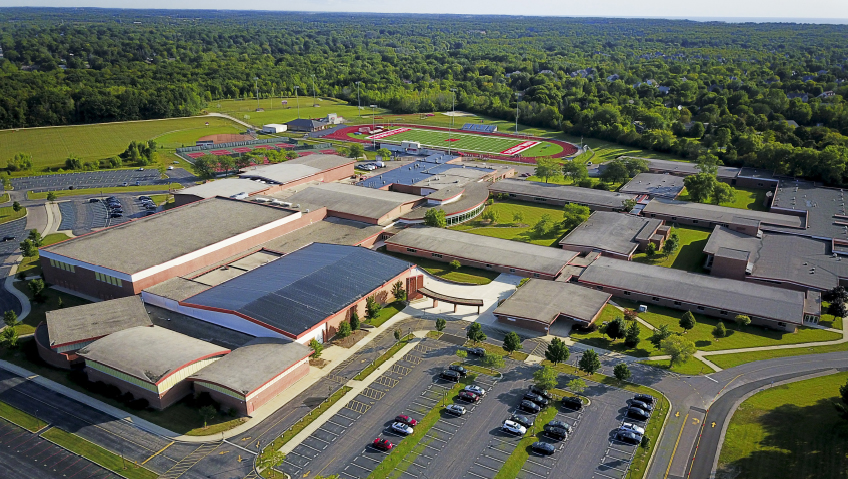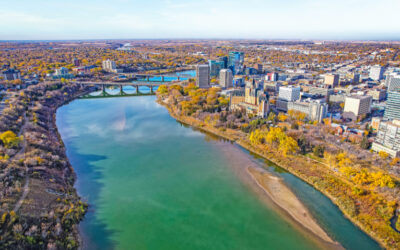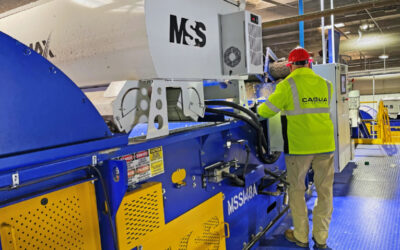‘Forward’ is just one word, but it sums up all that is positive, progressive, and purposeful. That is why the singular word was adopted as the State of Wisconsin’s motto in 1851. The sentiment holds the beliefs and values of its citizens and government, and it is to this mindset that the city of Mequon, Wisconsin, firmly adheres as it moves toward the future.
“Mequon is a city rich in rural heritage and natural beauty. It offers a government that advocates for its community members, promotes civic participation and enjoys a healthy economic base. In Mequon, our community protects the natural environment and values the high quality neighborhoods, safe community, public gathering spaces and strong educational and medical facilitates, all of which create a high quality of life.”
These characteristics have built a rich Mequon history and they remain priorities as the City implements change and plans for its forward future.
Incorporated in 1957, Mequon has a population of roughly 24,000, an area of 47 square miles, and is situated twenty-five miles north of Milwaukee, part of the Milwaukee Metropolitan Area. The geographic size of this bedroom community as well as its intent to maintain and offer a rural character makes this community unique and more diverse than other Midwest suburbs.
Two international airports, Chicago’s O’Hare International Airport, ninety-five miles to the south, and Milwaukee Mitchell International Airport, twenty-eight miles south, are also handy. “People use the two Chicago airports frequently,” notes Mayor John Wirth. The Port of Milwaukee is also located approximately twenty-one miles to the south of the city.
We’re about twelve minutes from downtown Milwaukee, so we’re very close and proximate to the downtown area, which I think is a huge benefit, feature, and attraction for businesses and residents here in Mequon,” City Administrator Will Jones adds.
Mequon has “a top-performing school district at the elementary and high school level that’s consistently ranked among the best performing public school districts in the state,” Jones affirms. To accommodate a skilled workforce that businesses want and need, Mequon is also home to Concordia University Wisconsin and Milwaukee Area Technical College (MATC). “We value the contributions both of those educational institutions provide our community,” says Mayor Wirth.
In 2019, the City’s Economic Development Board, in conjunction with Ozaukee County Economic Development Corporation, the Mequon-Thiensville Chamber of Commerce, and MATC, showcased the technology-based programs available at MATC and the Mequon Homestead High School’s world-renowned Robotics Team for October’s Manufacturing Month. The event celebrated technology within the community and played a role in connecting area businesses to educational institutions for workforce development, ongoing training and internships.
“This kind of affiliation and information sharing between our community partners, businesses and the City enables us to reach out to our industrial and light industrial businesses to ensure that we have a good feeling for why they’re in Mequon, what attracts them, why they stay, and how we can attract similar businesses to Mequon,” Mayor Wirth says.
Concordia University of Wisconsin is “a huge asset for the City from a development standpoint,” says Director of Community Development Kim Tollefson. “They continue to grow – not only their programs but their student growth.” In fact, the City’s Economic Development Board is going to partner with one of the marketing classes at Concordia. “In 2020, the class is going to create a marketing plan for implementation on behalf of the City. It’s just another example of civic partnerships that help our community be efficient in our work and resources.”
Mequon has established partnerships with the Village of Thiensville, Mequon-Thiensville Area Chamber of Commerce & Industry, Ozaukee County Economic Development Corporation, the local Rotary Clubs and the Mequon Community Foundation to foster the city’s economic growth. The Village of Thiensville (population 3,200) is situated within one square mile, completely surrounded by Mequon.
“One of our two largest commercial areas in Mequon extends into Thiensville. It was jointly envisioned almost twenty years ago. Both communities have worked on making it a reality,” says Mayor Wirth. The Mequon Town Center is approximately 100 acres of land intended for redevelopment as a mixed-use, traditional neighborhood. This Town Center has provided a robust economic base and is “providing services and restaurants to our respective residents,” he says.
Public – private partnerships have been key components to the successful redevelopment for this new neighborhood. The City has partnered with land owners, business owners, developers, other local and state agencies and local not-for-profit community organizations to implement change and achieve success toward the forward vision of the Town Center.
The Town Center is a traditional, walkable, compact mixed-use development that is home to over 30 new businesses attracted to the concept of sustainability, walkability and synergy among businesses. Many of the businesses are Wisconsin-based companies that have chosen Mequon Town Center as their second location or one of just a few locations located within the Milwaukee metropolitan area. These local businesses – owned and invested in by locals – provide a richness and cherished niche in the Mequon community that community leaders anticipate will help ensure future success. “Local pride in and for these business helps establish a foundation within the network of our businesses and longevity within our community system,” says Tollefson.
Since 2015, the City has experienced growth in the tax base of this redeveloping neighborhood, showcasing how land use decisions, economic development tools, design standards and a partnership with private investors is a formula for success.
The chart below highlights the nine Town Center sites that have been redeveloped since 2015. The base value of the neighborhood totaled $6.7 million, and is currently estimated at $124.5 million, resulting in a 1,744 percent increase in value. The City offers incentives only in a Pay As You Go form and only for clearing a site of dated or blighted buildings, infrastructure and site contamination. The result is a clean, greenfield redevelopment site. The City only reimburses the developer for the loss of the improvement value and the cost of cleanup and only after the new project is constructed and on the tax roll – an incentive that is a very low risk for the City. In the case of the Town Center, the City’s aggregate contribution through incentives is equivalent to approximately 7.4 percent of the net increase in overall value.
Overview of 9 Redeveloped Town Center Sites
| Development | Base Value | Projected Value | Incentive |
|---|---|---|---|
| Outpost Natural Food | $305,683 | $2,973,200 | $328,515 |
| Dermond Apartments | $99,689 | $8,000,000 | $646,000 |
| MTC1 Mixed Use | $1,936,791 | $18,790,600 | $1,800,000 |
| Spur 16 Mixed-use | $651,594 | $26,100,000 | $1,700,000 |
| Spectrum Investment | $1,035,400 | $1,862,100 | $0 |
| Reserve Apartments | $1,343,192 | $5,969,400 | $250,000 |
| RCAC Care Facility | $1,343,192 | $8,000,000 | $0 |
| Memory Care | $316,270 | $2,810,000 | $0 |
| Foxtown Mixed Use | $1,060,249 | $50,000,000 | $4,500,000 |
| $6,748,868 | $124,505,300 | $9,224,515 |
The City’s partnerships are not limited to just land owners and developers. The City partnered with a local financial institution, Bank Five Nine, to provide business start-up loans at low interest rates. The City’s role is to ensure the business type is fitting for the Town Center. Bank Five Nine vets the viability of the loan and within just a few business days, the new business is made aware of loan award. The financial institution is enthusiastic about its partnership at the local level as it contributes to these dynamic community reinvestment objectives.
Local organizations have also contributed amenities for residents, consumers and business owners of the Town Center. A Rotary Riverwalk has been planned and installed along the Milwaukee River to increase the opportunity for access to the river and connect various local landmarks and parks along the Riverwalk, including a connection between the City of Mequon and Village of Thiensville. The Mequon-Thiensville Junior Women’s Club contributed a new community event sign, and the Thiensville-Mequon Rotary Foundation is contributing a portion of the construction of a new gateway feature. These public contributions are just a few occurring within the neighborhood.
Tollefson adds that from a development perspective, the solid relationship with the chamber of commerce and local community organizations enables the City to “disseminate information about programs available to business, but also match public and private dollars toward common goals and ensure the City continues to adapt to the what the community prefers as its future going forward.”
The Lions Club, Rotary Clubs, and others “are very active in terms of helping the city and the community in identifying needs and then working to address those needs,” Jones adds. Those needs can come in the form of funding a canine unit for the police department, establishing Rotary Park, or creating projects such as the Riverwalk.
“Many of these clubs are energized and very proactive in terms of doing the fundraising, planning, and the organizing to help us realize our full potential as a community,” says Jones. “It helps us manage our expenses on the city side. That’s part of the reason why businesses want to locate to Mequon.”
And speaking of energy, the City hosts several community festivals. The City established a Festivals Committee, through which two events occur annually in the heart of the Town Center neighborhood. A large music festival called Gathering on the Green sees a two-day concert in Rotary Park with acts such as Cheap Trick, Trace Adkins, American Authors, Kenny Loggins, Lee Brice and Pat Benatar. The event includes a venue called Through Music Together, which partners with music industry professionals to develop and offer career opportunities, music clinics, and scholarships.
“The city of Mequon is interested in attracting and retaining high-quality commercial development in our existing commercial areas,” Mayor Wirth adds, indicating that part of the city’s strategy is not allowing the commercial areas to grow unchecked. “That simply cannibalizes the commercial development that would otherwise go in our existing commercial areas. We still are a community of 24,000 people, and we want to make sure we have adequate demand for successful and vital commercial districts.”
The city has four regional health networks which include Ascension St. Mary’s Hospital, Aurora Health, Children’s Hospital Wisconsin, and Froedtert & Medical College of Wisconsin, which plans to open micro-hospitals in Mequon in the fall of 2020. “Healthcare and personal wellness is a very successful land use for our community and a strong foundation for the development and professional job center that exists in the City’s second commercial district located along North Port Washington Road and Interstate 43,” says Tollefson. This district is a major commuter route to downtown Milwaukee.
Indeed, the district and City have an efficient transportation infrastructure enabling an accessible commute along Interstate 43 which runs through the city, with three interchanges at present and a fourth to be completed soon. “We also have a system of local roads that include two state truck highways,” says Director of Public Works, Kristen Lundeen. These highways include the 57, 167, and 181, and rail freight is provided by both the Canadian National Railway and Union Pacific.
The Mayor would like to continue to see “people having a strong interest in redeveloping underutilized properties within our commercial areas.” There is a lot of green space, and allowing commercial development to expand in these spaces that were not planned for commercial activity lessens the demand for existing commercial areas. “It’s important to maintain the nature of our community,” he says.
“We have plenty of room for traditional suburban commercial development,” continues Mayor Wirth of the city of 47 square miles. “A large portion of our community is more rural in character; we have about five square miles that are permanently preserved.” This was made possible through conservation subdivisions. “We’re a community of very diverse land uses. We don’t want to see the City become a generic, suburban, gray community.”
Among its many attractions are the city’s twenty-six parks, representing 1,200 acres, and its nature reserve, which is a unique 450-acre tract of land located in the southwest portion of the city. The Mequon Nature Preserve will convert farmland back to native prairie and woodlands over time. The project began ten years ago.
“It’s a community that is seeing some growth while at the same time preserving much of the rural character in the community and maintaining the quality of life,” Mayor Wirth says. He believes that controlled growth will ensure the vigor of his city so that “we don’t become something we’re not.”
The city is also safe, with a low crime rate “by local, regional and national benchmarks,” Jones states. “We have a growing tax base here in Mequon. Over the last five years or so, our equalized value has gone up by almost a billion dollars. We’re continuing to see tremendous investment with our focused, controlled growth.”
Mequon has one of the lowest tax rates of the cities and villages in the Milwaukee metropolitan area. “We’re very fiscally conservative,” explains Mayor Wirth. “We’ve maintained high property values in our community. We don’t allow just any business to come into the community. We maintain high-quality businesses [and] high-quality architecture which gives higher property values, which in turn, ensures we have lower tax rates for both residents and businesses,” he adds.
Low-end retail development is not encouraged. “It’s not consistent with our community – our quality of life. We have a fairly broad palette of types of businesses that we allow, and we welcome them, and we hope that we can work with them to make them successful.”
Businesses are also enticed to the city because they know what the city will do. “The city isn’t going to make decisions that lessen the value of their properties or their businesses by simply developing for development’s sake… The city largely sells itself. There’s always a lot of interest in our community by businesses.”
The median household income in Mequon is high and the average resident is in their mid-to-late forties and has a well-paying professional job. “The consumer base is certainly high despite having lower densities,” says Tollefson.
“It’s one of the more affluent communities in Wisconsin. It has a quality of life that attracts business owners, and that’s our greatest tool. It’s a great community in which to not only work but to live and play,” Mayor Wirth relates.













